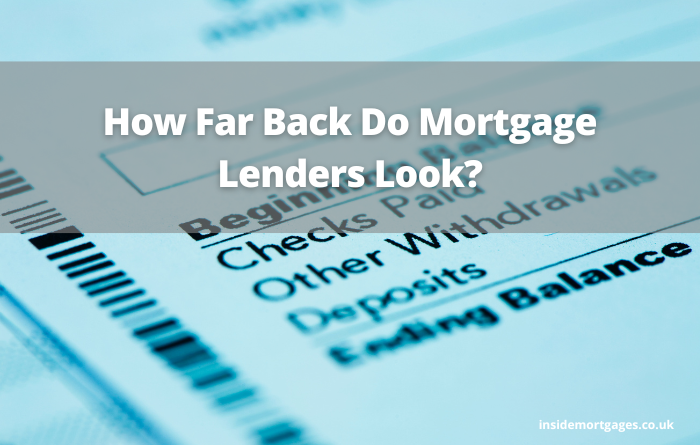How Far Back Do Mortgage Lenders Look? – Find Out Here
When you are applying for a mortgage, the lender will want to take a look at your financial history and credit score. They will probably go back as far as seven years to get an idea of how you have managed your finances. This is done to ensure that you are a responsible borrower and that you will be able to make timely payments on your mortgage.
It’s important that you keep this in mind when you are preparing to apply for a home loan. You’ll need to make sure that your credit score is as high as possible so that you can get the best interest rate available.
Credit Rating
If you have any concerns about how far back lenders will look into your finances, you can always check with the credit rating agencies to get a better idea.
In general, the further back lenders look, the more information they will have about your financial history. This can help them make a more informed decision about whether to give you a loan. However, it is also important to remember that your credit score is not the only factor that lenders will consider when approving a loan. They will also look at your employment history, income, and other factors. So, if you have a strong financial history, you may still be able to get a loan even if your credit score is not perfect.
The bottom line is that you should not worry too much about how far back mortgage lenders will look into your finances. As long as you have a solid financial history and a good credit score, you should be able to get the loan you need. Just make sure to do your research and compare offers from different lenders before making a final decision.
Improving Your Credit Rating

If you are worried about your credit rating and how far back lenders will look into your finances, there are some things you can do to improve your credit rating. One thing you can do is to make sure you always make your payments on time. This includes any bills, loans, or credit cards that you may have. Additionally, you can try to reduce the amount of debt you have. This will show lenders that you are working to improve your financial situation and that you are capable of managing your debts. Finally, you can try to get a copy of your credit report from the major credit reporting agencies. This will give you an idea of where you stand and what areas you need to work on.
By following these tips, you can improve your chances of getting approved for a loan. Just remember that the process takes time, so don’t expect to see results overnight. Be patient and work on improving your credit rating little by little. Soon, you’ll be in a much better position to get the home loan you need.
Bank Statements
Lenders will also ask to see your bank statements from the past few months. This is to verify your income and make sure that you have the funds available to make a down payment on the home. Be prepared to provide these documents when you are applying for a mortgage.
In general, lenders will only ask to see the last 2-3 months for the evidence they need. This information will give them real-time cash flow information. It obviously shows your current cash holdings, in the accounts offered, but also incoming wages and regular monthly expenditures.
Most importantly, bank statements offer the ability to demonstrate that enough savings are available each month to support the repayments. This must be considered before submission. If your real situation is not reflected in the recent accounts, you need to explain why not in a covering letter and supply evidence to support that. Examples are multiple accounts; savings accounts; recent wage rises or final payment on a direct debit, etc.
Bank statements are usually checked early in the underwriting process and not so at the point of closure. Very recent alterations are often not therefore questioned.
“Red Flags” to lenders on Bank Statements
Individual alerts are sometimes highlighted on bank statements:
Unexplained Deposits
If you have large unexplained or undocumented deposits, you may want to explain them in a covering letter when you submit your application. This will help the lender understand where the money came from and why it is not reflected in your bank statements. Be sure to provide evidence to support your explanation. If you can’t provide a good explanation, the lender may be less likely to approve your loan. If you have any recent late payments, the lender will want to know why. Be prepared to explain any late payments in a covering letter. Again, be sure to provide evidence to support your explanation. The lender may be more likely to approve your loan if they can see that the late payment was an isolated incident and that you have a good history of making on-time payments. If you see any red flags on your bank statements, be prepared to explain them to the lender. Be honest and provide evidence to support your explanation. The more information you can provide, the better chance you have of getting approved for a loan.
Undisclosed Payments
Regular payments that have not been disclosed as a planned outgoing elsewhere on your application. This may cause the lender to question where the money is going and why you have not included it in your monthly expenses. Be prepared to explain any regular payments in a covering letter. Be sure to provide evidence to support your explanation. The more information you can provide, the better chance you have of getting approved for a loan.
Inability To Pay
Payment requests that have not been able to be met (bounced cheques). This will show on your bank statements and the lender will want to know why you had insufficient funds to make the payment. Be prepared to explain any bounced cheques in a covering letter. Be sure to provide evidence to support your explanation. The more information you can provide, the better chance you have of getting approved for a loan.
Common Questions

Do all lenders require bank statements?
Most lenders will require bank statements as part of the mortgage application process. However, there are a few lenders who do not require bank statements. These lenders typically have other requirements in place, such as a higher credit score or a larger down payment.
How many months of bank statements does a lender usually require?
In general, most lenders will require two to three months of bank statements. However, some lenders may require more or less depending on the circumstances.
Can I get a mortgage if I have bad credit?
It is possible to get a mortgage with bad credit, but it may be more difficult than if you had good credit. You may need to provide additional information to the lender, such as a letter of explanation for your bad credit. Additionally, you may need to make a larger down payment or have a higher credit score than if you had good credit.
Can I get a mortgage if I have no job?
It is possible to get a mortgage without a job, but it may be more difficult than if you had a job. You will likely need to provide additional information to the lender, such as proof of assets or income from other sources. Additionally, you may need to make a larger down payment or have a higher credit score than if you had a job.
Do all lenders require tax returns?
No, not all lenders require tax returns. However, most lenders will require tax returns if you are self-employed or have income from other sources. Additionally, some lenders may require tax returns even if you are employed in order to verify your income.
Do all lenders require a down payment?
No, not all lenders require a down payment. However, most lenders will require a down payment if you have bad credit or no job. Additionally, some lenders may require a down payment even if you have good credit and a job in order to lower the risk of default.
How much money do I need for a down payment?
The amount of money you need for a down payment depends on the lender and the type of loan you are applying for. In general, most conventional loans will require a down payment of at least 20%. However, there are some government-backed loans that may require as little as 0% for a down payment. Additionally, some lenders may have their own requirements for a minimum down payment.
Can I get a mortgage if I have no money for a down payment?
It is possible to get a mortgage with no money for a down payment, but it may be more difficult than if you had money for a down payment. You will likely need to provide additional information to the lender, such as proof of assets or income from other sources. Additionally, you may need to make a higher credit score than if you had money for a down payment.
Do all lenders require good credit?
No, not all lenders require good credit. However, most lenders will require good credit if you have no job or a low down payment. Additionally, some lenders may require good credit even if you have a job and a high down payment in order to lower the risk of default.
What is the minimum credit score required for a mortgage?
The minimum credit score required for a mortgage depends on the lender and the type of loan you are applying for. In general, most conventional loans will require a credit score of at least 620. However, there are some government-backed loans that may allow for a lower credit score. Additionally, some lenders may have their own requirements for a minimum credit score.
Can I get a mortgage if I have bad credit?
It is possible to get a mortgage with bad credit, but it may be more difficult than if you had good credit. You may need to provide additional information to the lender, such as a letter of explanation for your bad credit. Additionally, you may need to make a larger down payment or have a higher credit score than if you had good credit.
Do all lenders require employment verification?
No, not all lenders require employment verification. However, most lenders will require employment verification if you have no job or bad credit. Additionally, some lenders may require employment verification even if you have good credit in order to verify your income.
Will You Qualify For A Mortgage Loan?
Now that you know how far back mortgage lenders will look, it’s time to start preparing your application. Be sure to have all of your documents in order and be prepared to explain any red flags on your bank statements. The more information you can provide, the better chance you have of getting approved for a loan. Good luck!

